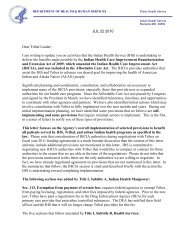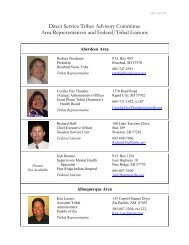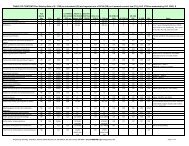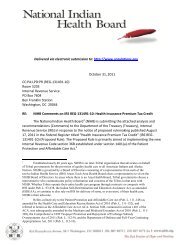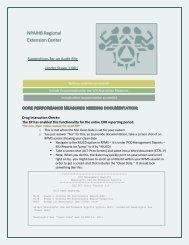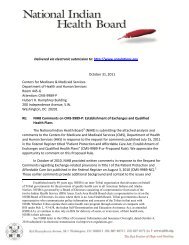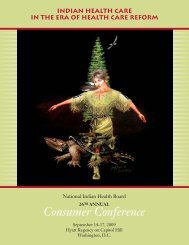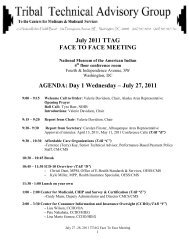mmpc - National Indian Health Board
mmpc - National Indian Health Board
mmpc - National Indian Health Board
Create successful ePaper yourself
Turn your PDF publications into a flip-book with our unique Google optimized e-Paper software.
1. Identify affected/potentially affected <strong>Indian</strong> Tribe(s)<br />
2. Determine Consultation Mechanism – The most useful and appropriate consultation<br />
mechanisms can be determined by HHS and/or <strong>Indian</strong> Tribe(s) after considering the critical<br />
event and <strong>Indian</strong> Tribe(s) affected/potentially affected. Consultation mechanisms include<br />
but are not limited to one or more of the following:<br />
a. Mailings<br />
b. Teleconference<br />
c. Face-to-Face Meetings at the Local, Regional and <strong>National</strong> levels between the HHS<br />
and <strong>Indian</strong> Tribes.<br />
d. Roundtables<br />
e. Annual HHS Tribal Budget and Policy Consultation Sessions.<br />
f. Other regular or special HHS Division or program level consultation sessions.<br />
A. Communication Methods: The determination of the critical event and the level of consultation<br />
mechanism to be used shall be communicated to affected/potentially affected <strong>Indian</strong> Tribe(s)<br />
using all appropriate methods and with as much advance notice as practicable. These methods<br />
include but are not limited to the following:<br />
3. Correspondence: Written communications shall be issued within 30 calendar days of an<br />
identified critical event. The communication should clearly provide affected/potentially<br />
affected <strong>Indian</strong> Tribe(s) with detail of the critical event, the manner and timeframe in<br />
which to provide comment. The HHS frequently uses a “Dear Tribal Leader Letter” (DTLL)<br />
format to notify individual <strong>Indian</strong> Tribes of consultation activities. Divisions should work<br />
closely with the Principal Advisor for Tribal Affairs, IOS/IGA if technical assistance is<br />
required for proper format and protocols, current mailing lists, and content.<br />
4. Official Notification: Within 30 calendar days, and upon the determination the consultation<br />
mechanism, proper notice of the critical event and the consultation mechanism utilized<br />
shall be communicated to affected/potentially affected <strong>Indian</strong> Tribe(s) using all appropriate<br />
methods including mailing, broadcast e-mail, FR, and other outlets. The FR is the most<br />
formal HHS form of notice used for consultation.<br />
5. Meeting(s): The Division shall convene a meeting, within 60 calendar days of official<br />
notification, with affected/potentially affected <strong>Indian</strong> Tribe(s) to discuss all pertinent issues<br />
in a national, regional, and/or local forum, or as appropriate, to the extent practicable and<br />
permitted by law, when the critical event is determined to have substantial impact.<br />
6. Receipt of Tribal Comment(s): The Division shall develop and use all appropriate methods<br />
to communicate clear and explicit instructions on the means and time frames for <strong>Indian</strong><br />
Tribe(s) to submit comments on the critical event, whether in person, by teleconference,<br />
and/or in writing and shall solicit the advice and assistance of the Principal Advisor for<br />
Tribal Affairs, IOS/IGA.<br />
7. Reporting of Outcome: The Division shall report on the outcomes of the consultation within<br />
90 calendar days of final consultation. For ongoing issues identified during the consultation,<br />
the Division shall provide status reports throughout the year to IOS/IGA and <strong>Indian</strong><br />
Tribe(s).<br />
A. HHS Response to Official Tribal Correspondence: Official correspondence from an <strong>Indian</strong> Tribe<br />
may come in various forms, but a resolution is the most formal declaration of an <strong>Indian</strong> Tribe’s<br />
position for the purpose of Tribal consultation. In some instances, <strong>Indian</strong> Tribes will submit<br />
official correspondence from the highest elected and/or appointed official(s) of the Tribe. HHS



